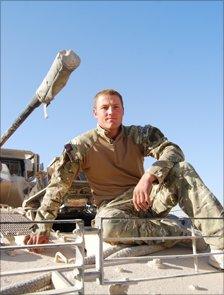Team effort key in Royal Welsh Afghanistan tour
- Published

Cpl Chris Harris said the training kicks in when in contact with the enemy
As the battle against the Taliban continues in Afghanistan, BBC Wales' Colette Hume spent time embedded with the Royal Welsh troops.
In the second of her reports, she spoke to Corporal Chris Harris, who joined other members of B Company in Helmand Province in late July.
This is what he told her.
"The kind of thing we do are reassurance or dominance patrols, we're looking to keep the population on our side and push the enemy troops backwards so we can have a better, safer environment for the people.
"We usual send out a number of patrols every day.... in between times the guys get quite a bit of chill time and they can use the facilities here and keep our Warriors [armoured vehicles] on the road to make sure they're good to go.
"When you're out on foot patrol there's various things that go through your head. We have to make sure all the guys are carrying out the right jobs also looking around the area, looking at the atmospherics.
"If there are people around then that's a good sign to us, it means nothing bad's going to happen but there's always the threat of the pressure pad plates when you go into unknown areas, but we do have our guys who are quite well trained, they do keep a good eye on the ground and they do see what we're walking through.
"When we're walking, we're looking to go into areas where we know populations haven't seen us before and we're trying to establish good working relationships with them. We like to go into areas where we can go as a big group to push the enemy back.
"Once you come back you have to make sure the guys don't switch off, that they're on top of their game until they get through the gate to the base - and when they get back through that gate and they're always aware they might have to go back out.
"About four weeks ago I was in the Warrior with my platoon sergeant and we were finding routes across open ground ready for a bigger op and a bigger picture. We pushed into a cornfield and I noticed five guys running across it.
"I passed it up on the radio and turned around, the five guys, who ran across and were suspicious.... one had long sleeves, he had a weapon on his back and we couldn't identify it properly because of the cornfield.
"As I turned around to face the front, I saw a red flash and a streak coming towards me and it was an RPG [rocket-propelled grenade]. Things were going through my head then, was I alright? Was the gunner alright, the guys at the back should have been alright because of the armour protection on the back of the vehicle.
Gunner
"Once we got back I spoke to the guys. The gunner was alright, he wasn't as shook up as I thought - it was his first contact with an enemy. I thought he did well, the gunner did really well on the gun.
"When you know you're in contact [with the enemy] you don't really think of anything. It's a thing that armies say worldwide - your training automatically kicks in and you go into everything you've been taught in training. There's a lot going on, but the main thing you concern yourself with as a commander is your troops around you.
"The main thing I take on board is to get the guys out on the ground, do the job and bring them all home in one piece.
"At the time you don't fear anything but once you have come home, once you're back in the camp location, then you think... that was close, a couple of inches... it could have been me... a couple of inches to the other side... it could have been the other guy and that's when you think how lucky you are that something didn't go wrong in that attack.
"My mum, she's an angel, she's glued to the BBC news, she's always listening... fathers are quite easy to talk to. I tell my father more than I tell my mother which is a good way of keeping me in track because I've got two people to talk to.
"There are things you'd tell your close friends, other things you want to keep to yourself.
"On the phones you can't say much, but when you're writing letters you can tell them details which you know is going to be a personal thing between yourselves.
"The thing I miss most is being with my parents and my family, me and my father play hell with my mother, we're looking forward to Christmas - seeing the family and having a laugh with my father.
"I think of myself as brave in the job I do and all my friends respect me for the job I do. But I honour the guys around me because there are no individuals in this group, it's a team effort and the guys have courage to actually step out of the camp and do the job you've asked them to do.
"The most respect goes out to those guys, you can't hold it all to yourself - it's the guys around you who help get the job done."
- Published13 December 2010
- Published12 December 2010